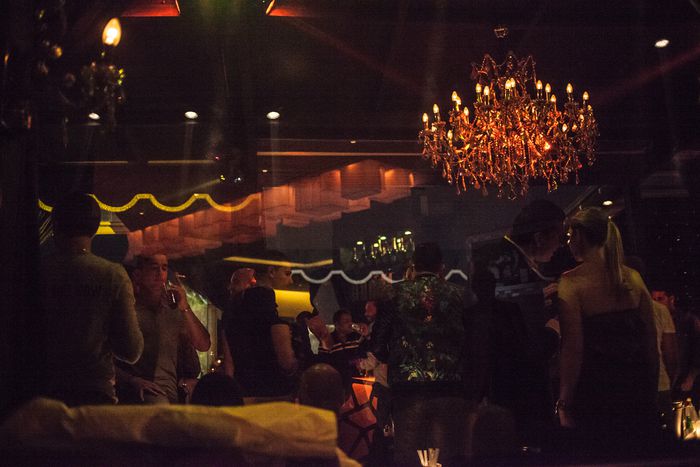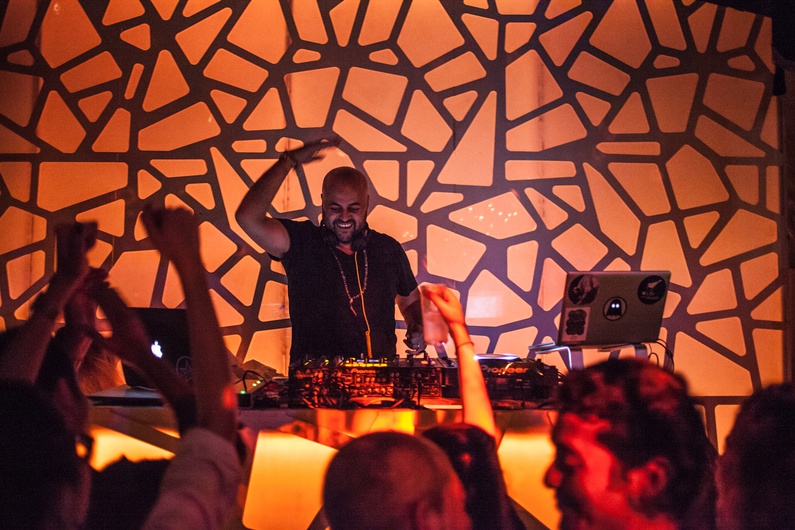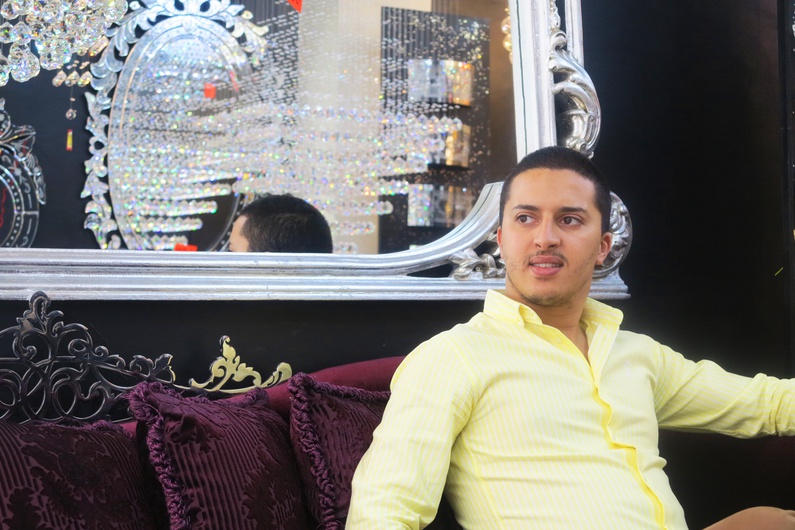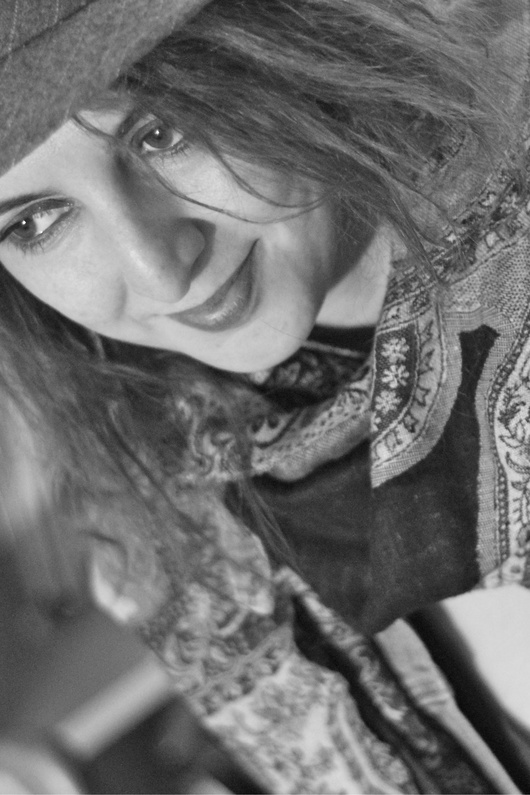
CASABLANCA'S GOLDEN YOUTH: THE BOURGEOIS SPRING
Published on
Translation by:
Garen Gent-RandallCasablanca is probably one of the only cities in the world that could have a trendy nightclub and a slum side by side on the same postcard. Behind the divide, this is a snapshot of the so-called 'golden youth' who many see as carrying the seeds of an entire country's social rift. cafébabel reports on the bling that sits between existential suffering and vodka by the gallon.
As the bar gets closer, the light dims like a screen fading to black. Soothed by the lounge music, a few girls in high heels bob their heads slowly while taking a drag of their cigarette, their hands wide open. In the distance, two girls are laughing over a glass of Chablis and ordering a plate of food they won't touch at the tables reserved for big spenders. All around are boys in suits and girls in strapless dresses, sliding over the Italian marble back to the room where the DJ is getting ready to start his deep-house set.
THE PRIME MINISTER'S SON IN TRAINSPOTTING
'Thursdeep' night in Casablanca. Overlooking the sea, the Skybar welcomes its regulars. Young heirs, rich kids, wealthy ex-pats, a few models. Simo Sajid knows Morocco's golden youth well. Every Thursday, he is the one who brings together the young elites of Morocco's economic capital at the hippest venue in what's known as 'la Naïda', Casablanca's nightlife scene. With his necklace and bracelets of wooden beads, the 39-year-old DJ looks just like a guru. Simo aka 'Seejay' has a lot of influence in these parts. Outside of the Skybar, he is the resident DJ at 25, another hot spot for spoiled youth. But Simo's excellent connections to the elite stem from the fact that he is part of it himself. 'Sajid' is also the surname of Mohammed, the mayor of Casablanca, and Simo's uncle. His father heads a large family business which deals in textiles and property. "I was always going to become the boss, which I was for ten years. And now I've gone from turnovers to turntables," he says, looking down behind his sunglasses.
 At the wheel of his Audi A6, Simo takes plenty of time to reflect on how to describe Casablanca's golden youth. 'Uncomfortable' is the word he finally chooses, a cigarette in his mouth. On the other side of the window are the streets of the district of Anfa, one of the city's richest areas, whose palm trees and huge gates make it look almost like Beverley Hills. "The golden youth doesn't like being talked about," he says as he turns a corner. "People have trouble being comfortable with themselves." It's well known that the young trendy bourgeoisie defines itself first and foremost by how much it spends. Huge saloons, vodka by the gallon, escorts — all the clichés are true. "You know the line from Trainspotting? ("Choose life. Choose a job. Choose a career. Choose a family..." – Ed.) Well, that's how it is around here."
At the wheel of his Audi A6, Simo takes plenty of time to reflect on how to describe Casablanca's golden youth. 'Uncomfortable' is the word he finally chooses, a cigarette in his mouth. On the other side of the window are the streets of the district of Anfa, one of the city's richest areas, whose palm trees and huge gates make it look almost like Beverley Hills. "The golden youth doesn't like being talked about," he says as he turns a corner. "People have trouble being comfortable with themselves." It's well known that the young trendy bourgeoisie defines itself first and foremost by how much it spends. Huge saloons, vodka by the gallon, escorts — all the clichés are true. "You know the line from Trainspotting? ("Choose life. Choose a job. Choose a career. Choose a family..." – Ed.) Well, that's how it is around here."
It took Laïla Marrakchi's 2005 film about Casa's rich kids, Marock, for the whole country to realise their excesses. Drugs, unbridled sexuality, car races — the film sparked controversy. A journalist lost it right in the middle of a press conference during the 8th national film festival in Tangiers, denouncing the Moroccan film-maker for putting Casablanca's filthy rich youth under the limelight while the city is home to 6.3 million people living in poverty. This anecdote comes from Sonia Terrab, a professional journalist and author of a notable book, Shamablanca. The young woman of 30, who comes from a well-off family from Meknes, incurred the wrath of her peers by painting the life of Shama. Why? "Because I was telling the truth." In other words, a youth that is scared of its own shadow and which is trying — not without problems — to save face. "It reminds me of 1950s high-society American youth," says Sonia. "The ones who were around just before the sexual revolution, who enjoyed everything but did it in secret."
Trailer for Marock, by Laïla Marrakchi (2005)
"THE WOLF OF WALL STREET, WITHOUT THE COKE"
Anis isn't at the Skybar to drink. Right in the middle of the dancefloor, he's only there "to have a Coke and enjoy the music". In a dark suit with a pink shirt and a matching handkerchief, this young Casablanca entrepreneur — he's only 28 — splits his time between Paris and Casa. In Paris's 16th arrondissement, he's about to become a notary. Here, he sells luxury chandeliers. He sighs heavily when asked about the indulgence all around. "To be honest, 60% of the people here don't do a damn thing and are happy to live off their parents' wealth."
 The next day, when Anis El Hamzi welcomes customers to his shop, Cristolux, situated in the shabby chic arrondissement of Mers Sultan, he's as fresh as the night before. Anis climbs into his Renault, closely-shaven and fully decked out in Armani. "I could have got myself a Panamera, but you see, I'm not a show-off. I decided to invest in a business instead," he explains. Something which meant he could buy a €650,000 villa with his mother, two streets away from one of King Mohammed VI's palaces. While he does the grand tour, the young businessman highlights the values his family instilled in him compared to those of the over-privileged youth. "Hard work, determination and manners," he explains. If he owes half of his success to his education, he owes the other half to France. His role models? "Sarkozy, Valls, Xavier Niel," but also Jordan Belfort, the dodgy trader brought to the screen by Leonardo Di Caprio. "You know, the Wolf of Wall Street. I identify with him a lot, just without the coke or the showing off." Anis El Hamzi sums himself up in one sentence, inscribed on a plaque in the villa's living room: 'Think Rich, Look Poor'.
The next day, when Anis El Hamzi welcomes customers to his shop, Cristolux, situated in the shabby chic arrondissement of Mers Sultan, he's as fresh as the night before. Anis climbs into his Renault, closely-shaven and fully decked out in Armani. "I could have got myself a Panamera, but you see, I'm not a show-off. I decided to invest in a business instead," he explains. Something which meant he could buy a €650,000 villa with his mother, two streets away from one of King Mohammed VI's palaces. While he does the grand tour, the young businessman highlights the values his family instilled in him compared to those of the over-privileged youth. "Hard work, determination and manners," he explains. If he owes half of his success to his education, he owes the other half to France. His role models? "Sarkozy, Valls, Xavier Niel," but also Jordan Belfort, the dodgy trader brought to the screen by Leonardo Di Caprio. "You know, the Wolf of Wall Street. I identify with him a lot, just without the coke or the showing off." Anis El Hamzi sums himself up in one sentence, inscribed on a plaque in the villa's living room: 'Think Rich, Look Poor'.
In the bubble
The truth is that Anis is the only one promoting the self-made man culture. In Casablanca, conformity remains the norm, and it is reinforced by what a monarchy entails. "Don't forget we're talking about a country where the king is still a rock star to young people," Anis says, between bites of a vanilla éclair from luxury food company Fauchon. "Or that he's elected for life!" In reality, it leads to the kind of thing where people "go abroad, party loads, then come back and pretend to work in the family fold," says Simo, "and the girls look for a job and a good husband." "When I sit down with these privileged young people to talk about societal issues, I get the impression that they're more closed-off than their parents," Sonia concludes.
 The reason? It's not their privileged lifestyles or the partying, but that a part of the population that could change things isn't. "I expected them to be open-minded, concerned by things, because most of them have lived abroad, because they're well-read. In a lot of countries, young rich people have been a driving force, but in Morocco, that's just not the case," says Sonia. In Casablanca, where 'the hippest place there is' rubs shoulders with one of the city's 500 slums, ignorance remains the byword in terms of summarising the relationships between the rich kids and the outside world. "There's a real physical barrier," Sonia explains through the clouds of smoke from her cigarette. "And that barrier is the car window." Once again, Anis distinguishes himself from the rest. He says he "helps with the city's poverty" by giving "a certain amount" of money to disabled people among the 111,500 families living in the slums. In any case, for the golden boy, "it's thanks to this contrast that we're one of the ten most stable countries in the world." However, in the minds of the golden youth, everything points towards Morocco remaining an unfathomable country where the lives of the rich consists of, in Sonia's words, "having your arse between several chairs and finding it comfortable. Or not."
The reason? It's not their privileged lifestyles or the partying, but that a part of the population that could change things isn't. "I expected them to be open-minded, concerned by things, because most of them have lived abroad, because they're well-read. In a lot of countries, young rich people have been a driving force, but in Morocco, that's just not the case," says Sonia. In Casablanca, where 'the hippest place there is' rubs shoulders with one of the city's 500 slums, ignorance remains the byword in terms of summarising the relationships between the rich kids and the outside world. "There's a real physical barrier," Sonia explains through the clouds of smoke from her cigarette. "And that barrier is the car window." Once again, Anis distinguishes himself from the rest. He says he "helps with the city's poverty" by giving "a certain amount" of money to disabled people among the 111,500 families living in the slums. In any case, for the golden boy, "it's thanks to this contrast that we're one of the ten most stable countries in the world." However, in the minds of the golden youth, everything points towards Morocco remaining an unfathomable country where the lives of the rich consists of, in Sonia's words, "having your arse between several chairs and finding it comfortable. Or not."
THIS ARTICLE IS PART OF A SPECIAL CAFEBABEL EDITION ON CASABLANCA AS PART OF THE "EUROMED REPORTER" PROJECT, INITIATED BY CAFEBABEL IN PARTNERSHIP WITH I-WATCH, SEARCH FOR COMMON GROUND AND THE ANNA LINDH FOUNDATION. YOU CAN FIND ALL THE ARTICLES from this edition ON THE FRONT PAGE OF THE MAGAZINE.


Translated from La jeunesse dorée de Casablanca : le printemps des bourges



